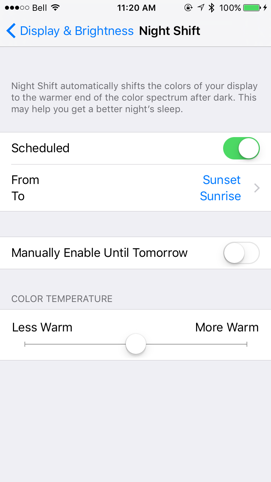I use my iPhone before bed to research projects and read the news. Who am I kidding, the reality is, I’m on Instagram and playing candy crush! But I can’t sleep. Researchers have indicated that blue light from these devices before bed might be bad for sleep.
What is blue light?
Blue Light occurs naturally in our environment. In fact, blue light is responsible for the color of the sky. But not all blue light is created equal.
Artificial blue light is emitted from iPhones, tablets, computers etc. and has higher concentrations of blue light versus natural light. Researchers have identified the blue light emitted from these devices has an alerting effect and disrupts circadian rhythms.
How does Blue Light affect sleep?
Blue light is implicated in circadian sleep disorders because of a disruption of melatonin production. Melatonin is the hormone that anticipates the daily onset of darkness. The hormone increases in your body approximately 2 hours before bedtime.
Circadian rhythms are produced by 2 factors; an individual’s natural biological clock and signals from the environment. The circadian system is looking for contrast. For example, historically we used to get up in the morning at sunrise and get ready for bed at sunset. Now, most of us are working in artificial light and we are no longer in sync with solar day cycles.
How do I change my Settings?
There is one easy adjustment you can make to your light-emitting devices. According to Apple, “Night Shift uses your iOS device’s clock and geolocation to determine when it’s sunset in your location, then it automatically shifts the colors in your display to the warmer end of the spectrum. In the morning, it returns the display to its regular settings.”
- Apple Devices: Go to Settings>Display and Brightness>Night Shift

- Android Devices: you can download apps HERE.
- Computers: download f.lux. This download makes the color of your computer’s display adapt to the time of day, warm at night and like sunlight during the day.
Does this really work?
I can speak from my own personal experience; yes, it does make a difference. I fall asleep faster. Also, I am not on my iPhone as long trying to “unwind”. Try these settings on your devices and tell us if it’s made a difference for you.
Coming in October!
Stay tuned for our upcoming sleep module where we discuss ways to improve sleep.
References:

